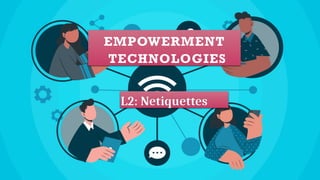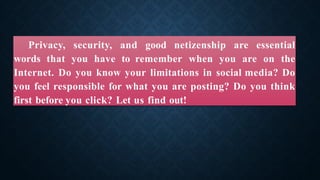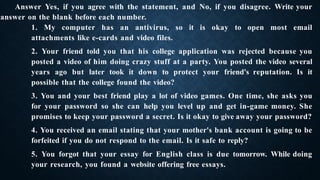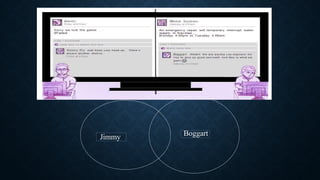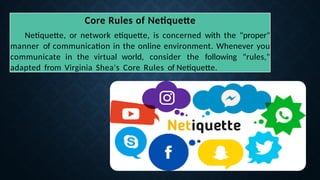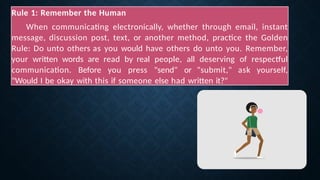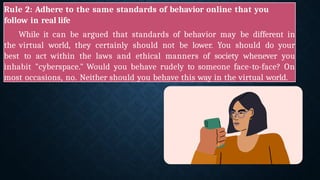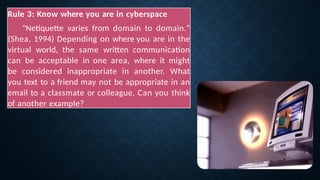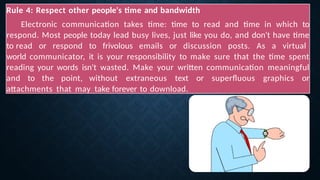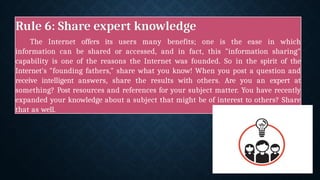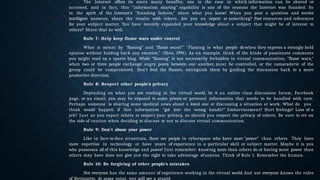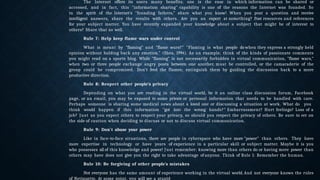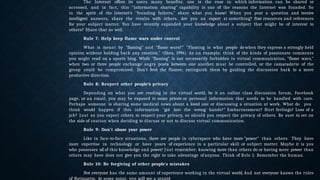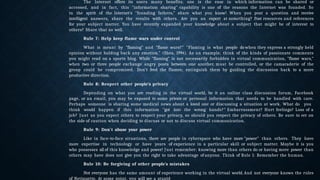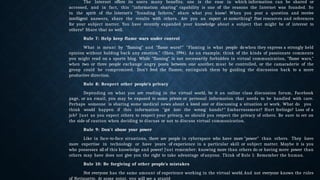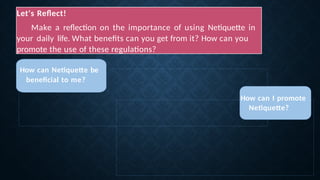Emp_Tech_2_Netiquettes through internet civilization.pptx
- 2. Privacy, security, and good netizenship are essential words that you have to remember when you are on the Internet. Do you know your limitations in social media? Do you feel responsible for what you are posting? Do you think first before you click? Let us find out!
- 3. Answer Yes, if you agree with the statement, and No, if you disagree. Write your answer on the blank before each number. 1. My computer has an antivirus, so it is okay to open most email attachments like e-cards and video files. 2. Your friend told you that his college application was rejected because you posted a video of him doing crazy stuff at a party. You posted the video several years ago but later took it down to protect your friend's reputation. Is it possible that the college found the video? 3. You and your best friend play a lot of video games. One time, she asks you for your password so she can help you level up and get in-game money. She promises to keep your password a secret. Is it okay to give away your password? 4. You received an email stating that your mother's bank account is going to be forfeited if you do not respond to the email. Is it safe to reply? 5. You forgot that your essay for English class is due tomorrow. While doing your research, you found a website offering free essays.
- 4. 6. There is a danger in posting information about a future vacation. 7. Letting people know your birthday is probably a must if you want to get as many gifts as possible. But having it in your profile makes you vulnerable to identity theft. 8. If there is no copyright notice, it's okay to copy a Web page. 9. Lurking is sometimes considered impolite. It is the practice of reading discussions without contributing to them 10. Your cousin asked for your fabulous zucchini cake recipe at the last family function. While you're sending it to him, you decide to e-mail it to all 500 people in your address book as well. It is an example of email spam.
- 6. Core Rules of Netiquette Netiquette, or network etiquette, is concerned with the "proper" manner of communication in the online environment. Whenever you communicate in the virtual world, consider the following "rules," adapted from Virginia Shea's Core Rules of Netiquette.
- 7. Rule 1: Remember the Human When communicating electronically, whether through email, instant message, discussion post, text, or another method, practice the Golden Rule: Do unto others as you would have others do unto you. Remember, your written words are read by real people, all deserving of respectful communication. Before you press "send" or "submit," ask yourself, "Would I be okay with this if someone else had written it?"
- 8. Rule 2: Adhere to the same standards of behavior online that you follow in real life While it can be argued that standards of behavior may be different in the virtual world, they certainly should not be lower. You should do your best to act within the laws and ethical manners of society whenever you inhabit "cyberspace." Would you behave rudely to someone face-to-face? On most occasions, no. Neither should you behave this way in the virtual world.
- 9. Rule 3: Know where you are in cyberspace "Netiquette varies from domain to domain." (Shea, 1994) Depending on where you are in the virtual world, the same written communication can be acceptable in one area, where it might be considered inappropriate in another. What you text to a friend may not be appropriate in an email to a classmate or colleague. Can you think of another example?
- 10. Rule 4: Respect other people's time and bandwidth Electronic communication takes time: time to read and time in which to respond. Most people today lead busy lives, just like you do, and don't have time to read or respond to frivolous emails or discussion posts. As a virtual world communicator, it is your responsibility to make sure that the time spent reading your words isn't wasted. Make your written communication meaningful and to the point, without extraneous text or superfluous graphics or attachments that may take forever to download.
- 11. Rule 5: Make yourself look good online One of the virtual world's best things is the lack of judgment associated with your physical appearance, the sound of your voice, or the clothes you wear (unlessyou post a video of yourself singing Karaoke in a clown outfit.) The quality of your writing will judge you, so keep the following tips in mind: Always check for spelling and grammar errors Know what you're talking about and state it clearly Be pleasant and polite
- 12. Rule 6: Share expert knowledge The Internet offers its users many benefits; one is the ease in which information can be shared or accessed, and in fact, this "information sharing" capability is one of the reasons the Internet was founded. So in the spirit of the Internet's "founding fathers," share what you know! When you post a question and receive intelligent answers, share the results with others. Are you an expert at something? Post resources and references for your subject matter. You have recently expanded your knowledge about a subject that might be of interest to others? Share that as well.
- 13. The Internet offers its users many benefits; one is the ease in which information can be shared or accessed, and in fact, this "information sharing" capability is one of the reasons the Internet was founded. So in the spirit of the Internet's "founding fathers," share what you know! When you post a question and receive intelligent answers, share the results with others. Are you an expert at something? Post resources and references for your subject matter. You have recently expanded your knowledge about a subject that might be of interest to others? Share that as well. Rule 7: Help keep flame wars under control What is meant by "flaming" and "flame wars?" "Flaming is what people do when they express a strongly held opinion without holding back any emotion." (Shea, 1994). As an example, think of the kinds of passionate comments you might read on a sports blog. While "flaming" is not necessarily forbidden in virtual communication, "flame wars," when two or three people exchange angry posts between one another, must be controlled, or the camaraderie of the group could be compromised. Don't feed the flames; extinguish them by guiding the discussion back to a more productive direction. Rule 8: Respect other people's privacy Depending on what you are reading in the virtual world, be it an online class discussion forum, Facebook page, or an email, you may be exposed to some private or personal information that needs to be handled with care. Perhaps someone is sharing some medical news about a loved one or discussing a situation at work. What do you think would happen if this information "got into the wrong hands?" Embarrassment? Hurt feelings? Loss of a job? Just as you expect others to respect your privacy, so should you respect the privacy of others. Be sure to err on the side of caution when deciding to discuss or not to discuss virtual communication. Rule 9: Don't abuse your power Like in face-to-face situations, there are people in cyberspace who have more "power" than others. They have more expertise in technology or have years of experience in a particular skill or subject matter. Maybe it is you who possesses all of this knowledge and power! Just remember: knowing more than others do or having more power than others may have does not give you the right to take advantage of anyone. Think of Rule 1: Remember the human. Rule 10: Be forgiving of other people's mistakes Not everyone has the same amount of experience working in the virtual world. And not everyone knows the rules of Netiquette. At some point, you will see a stupid
- 14. The Internet offers its users many benefits; one is the ease in which information can be shared or accessed, and in fact, this "information sharing" capability is one of the reasons the Internet was founded. So in the spirit of the Internet's "founding fathers," share what you know! When you post a question and receive intelligent answers, share the results with others. Are you an expert at something? Post resources and references for your subject matter. You have recently expanded your knowledge about a subject that might be of interest to others? Share that as well. Rule 7: Help keep flame wars under control What is meant by "flaming" and "flame wars?" "Flaming is what people do when they express a strongly held opinion without holding back any emotion." (Shea, 1994). As an example, think of the kinds of passionate comments you might read on a sports blog. While "flaming" is not necessarily forbidden in virtual communication, "flame wars," when two or three people exchange angry posts between one another, must be controlled, or the camaraderie of the group could be compromised. Don't feed the flames; extinguish them by guiding the discussion back to a more productive direction. Rule 8: Respect other people's privacy Depending on what you are reading in the virtual world, be it an online class discussion forum, Facebook page, or an email, you may be exposed to some private or personal information that needs to be handled with care. Perhaps someone is sharing some medical news about a loved one or discussing a situation at work. What do you think would happen if this information "got into the wrong hands?" Embarrassment? Hurt feelings? Loss of a job? Just as you expect others to respect your privacy, so should you respect the privacy of others. Be sure to err on the side of caution when deciding to discuss or not to discuss virtual communication. Rule 9: Don't abuse your power Like in face-to-face situations, there are people in cyberspace who have more "power" than others. They have more expertise in technology or have years of experience in a particular skill or subject matter. Maybe it is you who possesses all of this knowledge and power! Just remember: knowing more than others do or having more power than others may have does not give you the right to take advantage of anyone. Think of Rule 1: Remember the human. Rule 10: Be forgiving of other people's mistakes Not everyone has the same amount of experience working in the virtual world. And not everyone knows the rules of Netiquette. At some point, you will see a stupid
- 15. The Internet offers its users many benefits; one is the ease in which information can be shared or accessed, and in fact, this "information sharing" capability is one of the reasons the Internet was founded. So in the spirit of the Internet's "founding fathers," share what you know! When you post a question and receive intelligent answers, share the results with others. Are you an expert at something? Post resources and references for your subject matter. You have recently expanded your knowledge about a subject that might be of interest to others? Share that as well. Rule 7: Help keep flame wars under control What is meant by "flaming" and "flame wars?" "Flaming is what people do when they express a strongly held opinion without holding back any emotion." (Shea, 1994). As an example, think of the kinds of passionate comments you might read on a sports blog. While "flaming" is not necessarily forbidden in virtual communication, "flame wars," when two or three people exchange angry posts between one another, must be controlled, or the camaraderie of the group could be compromised. Don't feed the flames; extinguish them by guiding the discussion back to a more productive direction. Rule 8: Respect other people's privacy Depending on what you are reading in the virtual world, be it an online class discussion forum, Facebook page, or an email, you may be exposed to some private or personal information that needs to be handled with care. Perhaps someone is sharing some medical news about a loved one or discussing a situation at work. What do you think would happen if this information "got into the wrong hands?" Embarrassment? Hurt feelings? Loss of a job? Just as you expect others to respect your privacy, so should you respect the privacy of others. Be sure to err on the side of caution when deciding to discuss or not to discuss virtual communication. Rule 9: Don't abuse your power Like in face-to-face situations, there are people in cyberspace who have more "power" than others. They have more expertise in technology or have years of experience in a particular skill or subject matter. Maybe it is you who possesses all of this knowledge and power! Just remember: knowing more than others do or having more power than others may have does not give you the right to take advantage of anyone. Think of Rule 1: Remember the human. Rule 10: Be forgiving of other people's mistakes Not everyone has the same amount of experience working in the virtual world. And not everyone knows the rules of Netiquette. At some point, you will see a stupid
- 16. The Internet offers its users many benefits; one is the ease in which information can be shared or accessed, and in fact, this "information sharing" capability is one of the reasons the Internet was founded. So in the spirit of the Internet's "founding fathers," share what you know! When you post a question and receive intelligent answers, share the results with others. Are you an expert at something? Post resources and references for your subject matter. You have recently expanded your knowledge about a subject that might be of interest to others? Share that as well. Rule 7: Help keep flame wars under control What is meant by "flaming" and "flame wars?" "Flaming is what people do when they express a strongly held opinion without holding back any emotion." (Shea, 1994). As an example, think of the kinds of passionate comments you might read on a sports blog. While "flaming" is not necessarily forbidden in virtual communication, "flame wars," when two or three people exchange angry posts between one another, must be controlled, or the camaraderie of the group could be compromised. Don't feed the flames; extinguish them by guiding the discussion back to a more productive direction. Rule 8: Respect other people's privacy Depending on what you are reading in the virtual world, be it an online class discussion forum, Facebook page, or an email, you may be exposed to some private or personal information that needs to be handled with care. Perhaps someone is sharing some medical news about a loved one or discussing a situation at work. What do you think would happen if this information "got into the wrong hands?" Embarrassment? Hurt feelings? Loss of a job? Just as you expect others to respect your privacy, so should you respect the privacy of others. Be sure to err on the side of caution when deciding to discuss or not to discuss virtual communication. Rule 9: Don't abuse your power Like in face-to-face situations, there are people in cyberspace who have more "power" than others. They have more expertise in technology or have years of experience in a particular skill or subject matter. Maybe it is you who possesses all of this knowledge and power! Just remember: knowing more than others do or having more power than others may have does not give you the right to take advantage of anyone. Think of Rule 1: Remember the human. Rule 10: Be forgiving of other people's mistakes Not everyone has the same amount of experience working in the virtual world. And not everyone knows the rules of Netiquette. At some point, you will see a stupid
- 17. The Internet offers its users many benefits; one is the ease in which information can be shared or accessed, and in fact, this "information sharing" capability is one of the reasons the Internet was founded. So in the spirit of the Internet's "founding fathers," share what you know! When you post a question and receive intelligent answers, share the results with others. Are you an expert at something? Post resources and references for your subject matter. You have recently expanded your knowledge about a subject that might be of interest to others? Share that as well. Rule 7: Help keep flame wars under control What is meant by "flaming" and "flame wars?" "Flaming is what people do when they express a strongly held opinion without holding back any emotion." (Shea, 1994). As an example, think of the kinds of passionate comments you might read on a sports blog. While "flaming" is not necessarily forbidden in virtual communication, "flame wars," when two or three people exchange angry posts between one another, must be controlled, or the camaraderie of the group could be compromised. Don't feed the flames; extinguish them by guiding the discussion back to a more productive direction. Rule 8: Respect other people's privacy Depending on what you are reading in the virtual world, be it an online class discussion forum, Facebook page, or an email, you may be exposed to some private or personal information that needs to be handled with care. Perhaps someone is sharing some medical news about a loved one or discussing a situation at work. What do you think would happen if this information "got into the wrong hands?" Embarrassment? Hurt feelings? Loss of a job? Just as you expect others to respect your privacy, so should you respect the privacy of others. Be sure to err on the side of caution when deciding to discuss or not to discuss virtual communication. Rule 9: Don't abuse your power Like in face-to-face situations, there are people in cyberspace who have more "power" than others. They have more expertise in technology or have years of experience in a particular skill or subject matter. Maybe it is you who possesses all of this knowledge and power! Just remember: knowing more than others do or having more power than others may have does not give you the right to take advantage of anyone. Think of Rule 1: Remember the human. Rule 10: Be forgiving of other people's mistakes Not everyone has the same amount of experience working in the virtual world. And not everyone knows the rules of Netiquette. At some point, you will see a stupid
- 18. Let's Reflect! Make a reflection on the importance of using Netiquette in your daily life. What benefits can you get from it? How can you promote the use of these regulations? How can Netiquette be beneficial to me? How can I promote Netiquette?
